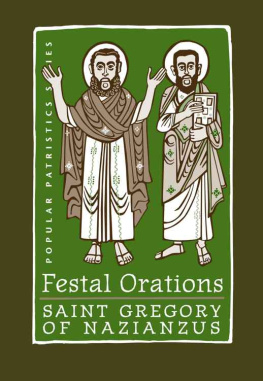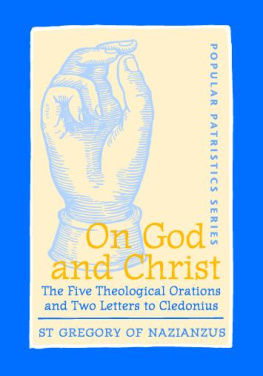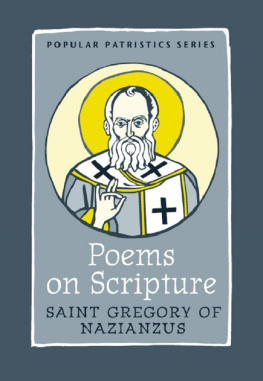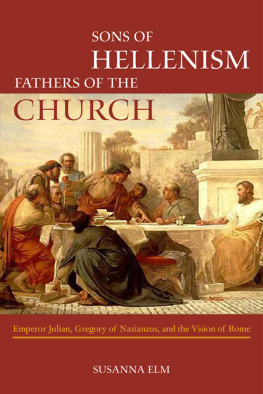St. Gregory of Nazianzus - Festal Orations
Here you can read online St. Gregory of Nazianzus - Festal Orations full text of the book (entire story) in english for free. Download pdf and epub, get meaning, cover and reviews about this ebook. year: 2011, publisher: St Vladimir’s Seminary Press, genre: Religion. Description of the work, (preface) as well as reviews are available. Best literature library LitArk.com created for fans of good reading and offers a wide selection of genres:
Romance novel
Science fiction
Adventure
Detective
Science
History
Home and family
Prose
Art
Politics
Computer
Non-fiction
Religion
Business
Children
Humor
Choose a favorite category and find really read worthwhile books. Enjoy immersion in the world of imagination, feel the emotions of the characters or learn something new for yourself, make an fascinating discovery.
- Book:Festal Orations
- Author:
- Publisher:St Vladimir’s Seminary Press
- Genre:
- Year:2011
- Rating:4 / 5
- Favourites:Add to favourites
- Your mark:
- 80
- 1
- 2
- 3
- 4
- 5
Festal Orations: summary, description and annotation
We offer to read an annotation, description, summary or preface (depends on what the author of the book "Festal Orations" wrote himself). If you haven't found the necessary information about the book — write in the comments, we will try to find it.
Festal Orations — read online for free the complete book (whole text) full work
Below is the text of the book, divided by pages. System saving the place of the last page read, allows you to conveniently read the book "Festal Orations" online for free, without having to search again every time where you left off. Put a bookmark, and you can go to the page where you finished reading at any time.
Font size:
Interval:
Bookmark:
ST GREGORY OF NAZIANZUS
F estal O rations
Translated with Introduction and Commentary by
Nonna Verna Harrison
ST VLADIMIRS SEMINARY PRESS
YONKERS, NEW YORK
Popular Patristics Series
Number
The Popular Patristics Series published by St Vladimirs Seminary Press provides readable and accurate translations of a wide range of early Christian literature to a wide audiencestudents of Christian history to lay Christians reading for spiritual benefit. Recognized scholars in their fields provide short but comprehensive and clear introductions to the material. The texts include classics of Christian literature, thematic volumes, collections of homilies, letters on spiritual counsel, and poetical works from a variety of geographical contexts and historical backgrounds. The mission of the series is to mine the riches of the early Church and to make these treasures available to all.
Series Editor
JOHN BEHR
Associate Editor
AUGUSTINE CASIDAY

COPYRIGHT 2008 BY
ST VLADIMIRS SEMINARY PRESS
Scarsdale Road, Yonkers, NY 10707
1-800-204-2665
www.svspress.com
ISBN 978-0-88141-912-2
ISSN 1555-5755
All Rights Reserved
For Fr Stephan and Matushka Elaine Meholick, with thanksgiving.
Preface
I would like to thank the faculty, students, and library staff of Saint Paul School of Theology for their support and encouragement during the writing of this book. Let me also thank the editor, Augustine Casiday, and the staff at St Vladimirs Seminary Press, for their diligent work on the manuscript.
In addition, let me acknowledge with appreciation the publishers of material that is reprinted, with revisions, here. An earlier version of my translation of Oration 38 was published as Gregory Nazianzen, Homily on the Birth of Christ, in Religions of Late Antiquity in Practice , edited by Richard Valantasis and published by Princeton University Press.
I have endeavored to convey the beauty of Gregorys rhetorical prose as far as is possible in clear, contemporary English. Inevitably, I have fallen short. This gap between text and translation, and any other errors that may be found in this book, are my responsibility.
Notes
N.V. Harrison, Gregory Nazianzen, Homily on the Birth of Christ, in Religions of Late Antiquity in Practice (ed. Richard Valantasis; Princeton, NJ: Princeton University Press, 2000).
N.V. Harrison, Gregory Nazianzens Festal Spirituality: Anamnesis and Mimesis, Philosophy and Theology 18 (2006): 2751.
N.V. Harrison, The Word Cries Out from the Virgins Womb: Gregory of Nazianzus, Oration 45.13, Studia Patristica , forthcoming.
Introduction
In the Orthodox church Gregory of Nazianzus (ca. AD 329ca. 390) is known as the Theologian, a title he shares only with the apostle and evangelist John, and is among the most honored of the saints. Together with his colleagues Basil the Great (ca. 329379) and Gregory of Nyssa (ca. 335395), he is one of the three Cappadocian fathers, and together with Basil and John Chrysostom (ca. 347407) he is one of the three great hierarchs and ecumenical teachers of the Eastern church. His reputation and influence in the Byzantine world as both theologian and rhetor are unsurpassed in ways that Western scholars have sometimes overlooked. The homilies translated in this volume have arguably been the most influential of his works throughout the Orthodox churchs history.
Byzantines made more copies of Gregorys writings than of any other texts except those of Holy Scripture. His theological influence was pervasive in the eastern Roman world. Maximus the Confessors Ambigua is a commentary on difficult passages in his orations, and twenty other Byzantine commentaries or scholia on his works are known.
The Theologian was read for the content of what he said, but just as much for the beautiful ways he said it. George A. Kennedy observes that Gregory became the great model for the union of Greek eloquence and Christianity and was so studied throughout the Byzantine period.
Gregorys homilies were also appointed for reading in church. By the ninth century, sixteen of his forty-five orations had been chosen to be read on specific feast days or saints days, or as commentary on the gospel lesson for the day. At least thirty-four manuscripts of all or part of this subset are extant, some of them beautifully illuminated, in which the order of the homilies follows the lectionary and the liturgical calendar.
Moreover, the poetic prose of Gregorys homilies, especially the Festal Orations , is quoted extensively in Byzantine hymnography, which is sung at the high point of the church year. So Orthodox Christians have been learning and praying his theology in church for over a thousand years, even if they have never read his writings. Attentive readers familiar with the churchs festal hymnography will find passages in this book that seem strikingly familiar.
In the West, Gregory is best known for his Five Theological Orations , a classic response to the theology of Eunomius, a late, radicalized form of Arianism. However, the opinion of some scholars that he would have been a minor figure had he not written the Theological Orations ignores the vast range of his impact in the Eastern churches, where his Festal Orations have been a formative influence. In the context of festal proclamation and celebration Gregory articulates his own theology with emphases and rhetorical features different from those found in the five discourses where he debates his neo-Arian opponents on their own ground. He also shows clearly how the doctrines he proclaims are inseparably intertwined with his pastoral teachings about Christian life. These homilies distinctive festal emphases have contributed to the shaping of Eastern Christian theology and spirituality in ways that have escaped the notice of those who read only the Theological Orations , as important as they truly are.
Gregorys Life and Work
Gregory was born near Nazianzus in Cappadocia of a wealthy aristocratic family. His father, a distinguished landowner and civic leader known to posterity as Gregory the Elder, belonged to a religious group that worshipped the Most High God, but in middle age he converted to Christianity through the influence of his wife Nonna, a devout lifelong Christian, and soon became pastor of his local community. He served as bishop of Nazianzus for about fifty years and built a church there. He and Nonna had three children, a daughter Gorgonia and two sons, Gregory and his younger brother Caesarius. The younger Gregory remained close to his family and wrote about them. All five are considered saints in the Orthodox world.
Gregory the Elder sent both sons abroad to obtain the best higher education available in the fourth-century Roman world. In 347348 they went first to Caesarea in Palestine where Origen had taught in the previous century and where his library and teachings remained an active presence, and then to Origens home town, Alexandria, a multicultural center of philosophical, Jewish and Christian learning. Gregory probably learned some of the rich heritage of theology, biblical interpretation and spiritual life from Christian teachers in both these cities. Caesarius, who later served as a physician at the imperial court in Constantinople, stayed in Alexandria to study medicine, but in 348 Gregory moved on to Athens, which in this period was an ancient and international university town, rather like Oxford or Cambridge today. Students went there from around the Mediterranean world to immerse themselves in Greek classical culture. Gregory fell in love with the scholarly life there and stayed for ten years of graduate work in rhetoric, the art of education and advocacy, of finely crafted writing and public speaking. Its study also involved learning philosophy, classical literature, and literary criticism. In Athens Gregory roomed with Basil, a fellow Cappadocian student and close friend. Both excelled in their studies, were devoted to the church, and vowed to dedicate their lives to Gods service. When Basil left to go home to Cappadocia, Gregory stayed on for another year. He may have begun teaching in Athens and perhaps was offered a faculty position there, but he too returned home in 358 or 359. His extensive education would prove invaluable in his subsequent work as pastor, preacher, theologian, and poet.
Next pageFont size:
Interval:
Bookmark:
Similar books «Festal Orations»
Look at similar books to Festal Orations. We have selected literature similar in name and meaning in the hope of providing readers with more options to find new, interesting, not yet read works.
Discussion, reviews of the book Festal Orations and just readers' own opinions. Leave your comments, write what you think about the work, its meaning or the main characters. Specify what exactly you liked and what you didn't like, and why you think so.







